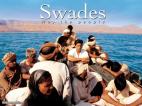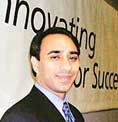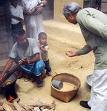
Experts on the subject of innovation say that ‘failure is good’ and that fear of failure often leads people to strive for creativity. CNBC's expert on learning and innovation and CEO of Socratic Arts, Roger Schank feels that innovation is something that should be freely forthcoming, like how children innovate spontaneously all the time, but there are others who feel that everyone should be given the space to innovate - from the executive down to the security guard.
This is ofcourse what the ideal workplace would do but that kind of Utopia rarely exists because in reality, the boss would rather listen to that expensive, Harvard dolt than the brimming-with-enthusiasm lift operator, who just may have some great ideas. As Schank puts it "Harvard graduates are good at being....Harvard graduates!" He also advises that employers should look at hiring the bottom 10% of the class at Harvard because these kids were smart enough to get in but then quickly felt disillusioned and he wanted to know what their reasons were for not doing well in class.

But he does give former CEO, SouthWest Airlines, Howard Putnam a pat on his shoulder for thinking about offering a low-cost airline with great service before the big giants of the US aviation industry, like United Airlines, understood the concept. Former CEO, SouthWest Airlines, Howard Putnam told CNBC's Maria Bartiromo, "One key thing we did was, we said we'd hire attitude and we will teach them the skills. So, we hired attitudes, we teach the skills and then you get the people who fit the culture that you are trying to build and the opportunity for innovation increases and the opportunity for failure decreases." And ofcourse, the reason SouthWest succeeded was because the bigger airlines managed to make their customers feel miserable.
Then there is the saying that a part of the success of innovating is a willingness to fail. So, do bosses agree with that? Do they hire people and allow them to fail? Putnam says, "You got to say if you do fail, I am not going to slap your hands and throw you out of the door. If you do that, then innovations will go away."

President of Hearst Magazines, Cathleen Black says, "I am not sure that if you are thinking about hiring somebody who has had any number of different failures but I think it depends to some extent, on the scale of those failures but what we are all saying is, we want a culture that encourages risk and innovation and I think that’s the most important thing."
Founder of Khosla Ventures (a venture capital), Vinod Khosla adds, "There are two kinds of failure. There is failure because you fail to change and failure because you try something new. I look on the upside not on the downside and that’s the asset of succeeding in the new world. In fact in our business the biggest risk is not taking any risk."
How do you stay innovative? Today everyone says that Google is an amazingly innovative company but the key question is can it keep that innovation mojo. Google is taking on ebay, PayPal, it is killing Mapquest and it’s changing the advertising game by selling directly to newspapers and small businesses. But Google whose global search market share reached nearly 73% in October 2006 but still trails Yahoo in total traffic and Google’s biggest challenge maybe inside the company rather than outside.

One of Google’s core strengths is hiring the best and the brightest. The biggest brains in America and the world could be a headache. Google knows the value of innovation, now it's a challenge to retain the right employees and using their creativity.
Schank agrees, "Google is being particularly innovative company. Search engines have been around for a really long time and they had a little bit better one than other people. I am willing to believe that Google employees are happy employees. They have a lot of money so they should be innovating a lot more."
Schank adds, 'I think if you want to keep your people, you better make sure that there are really good ideas being percolated all the time. That will keep your people.'
The Rite Way To InnovateRite Solutions is software company that twists the stock market to let the creamy stocks rise to the top of the heap. It builds advanced — and highly classified — command-and-control systems for the Navy, and innovation is built into the fabric of the company.
“We wanted to start an experiment to see if it was possible to innovate and if a pyramid organization could be replaced by a community of employees that could be part of that innovation,” says Chief Executive Officer, Rite Solutions, Jim Lavoie whose main responsibility is charting the course for Rite-Solutions and create the culture that separates Rite Solutions from a typical IT firm.
Lavoie’s came up with an innovative in-house stock or internal market game, called Mutual Fun, where any company employee could propose either the acquisition of a new technology, a new business idea, a new service or product launch and make efficiency improvements in the company.
Each idea or proposal in the highly popular market game becomes a stock and comes complete with ticker symbols, discussion lists and e-mail alerts. Each stock comes with a detailed description — called an 'expectus', as opposed to a prospectus — and begins trading at a price of $10. Every employee gets $10,000 in 'opinion money' to allocate among the offerings, and employees signal their enthusiasm by investing in a stock and, better yet, volunteering to work on the project.
Employees buy or sell these stocks, and prices change to reflect the sentiments of the company's engineers, computer scientists and project managers — as well as its marketers, accountants and even the receptionist. Volunteers share in the proceeds, in the form of real money, if the stock becomes a product or delivers savings.
The other popular software from the company is called the 3-D Data Visualization software, which was created by four technologists in the firm and is currently licensed to the US Navy. This software alone accounts for up to 30% of the company’s annual growth. “We’re trying to take advantage of those quiet geniuses in the company,” says Lavoie. So, while it’s all right to have community and employee participation, it often boils down to sound business practice.
“We were able to experiment with the notion of community as opposed to corporation, and participation instead of hierarchy. It has been a lot of fun,” concludes Lavoie

Khosla says, 'Let me disagree, Apple is a great example, they had a lot of innovation, then they introduced a lot of process and killed all the innovations. When Steve Jobs came back, he re-introduced a passion and a vision and innovation.'
He adds, 'You cannot have innovation in a command and controlled environment. If you encourage risk-taking, you encourage experimentation and if you allow and reward failure, you will see innovation in the corporation.'
In fact, during the 12 years Jobs was gone, Apple stocks rose 120%, in 10 years and since he came back, it has risen more than 2260% - barely blinking even when he left for a short time in 2004 - to battle pancreatic cancer. What would the Wall Street do, if Jobs was out of his job? Apple without Jobs would lose 20% of its market value, which is USD 60 billion. But in a company filled with talented people, it's hard to name a single other executive. One has to wonder what’s next, after all nothing and no one can last forever.

Another maverick entrepreneur who has built a brand from scratch with Virigin Records and now has 200 businesses flaunting that Virgin brand name, is Richard Branson. He personifies his brand - it's fun, puts its customers first over shareholders (as anyone who has flown Virgin Atlantic will testify to this), and was the small competitor who stood up to big-time bully and monopolist British Airways.
Branson says as much in his autobiography 'Losing my Virginity', that for him, his employees matter the most. If they are happy, they provide good service to his customers who come back again and again for that fabled service, thus keeping shareholders happy. His penchant for making business seem like a lighthearted affair has won him kudos....as well as brickbats. But ultimately, Virgin's many businesses are bringing in the money.
His entrepreneurship and his ability to build an empire with a single brand and make it an unbelievable adventure along the way, has made him the success story he is today.
Written for moneycontrol.com
 If you are an experienced woman traveller who knows how to traipse around the world like a pro but yet there are moments when you just don’t want to be around members of the opposite sex because you are recovering from a broken heart or some illness, then there is another opportunity for you.
If you are an experienced woman traveller who knows how to traipse around the world like a pro but yet there are moments when you just don’t want to be around members of the opposite sex because you are recovering from a broken heart or some illness, then there is another opportunity for you. But her tours are not cheap because as she says, her club is “situated between the Fiat and Mercedes price points”. So, she may not be as expensive as Cox and King and Thomas Cook but she doesn’t do bare-bones budget tours either because she admits “Indians are not ready for backpacking kind of trips.”
But her tours are not cheap because as she says, her club is “situated between the Fiat and Mercedes price points”. So, she may not be as expensive as Cox and King and Thomas Cook but she doesn’t do bare-bones budget tours either because she admits “Indians are not ready for backpacking kind of trips.” She told me that it would cost each member Rs 3,500 and it will be valid for 3 years. Members will get a 2% cash discount and will enjoy preferred pricing on select lifestyle products/services. She’s also going to organize discounted trips of a shorter duration (2-3 days) for her members. There are also plans for her club members to enjoy, for instance, six wine evenings in three months and other such events in various cities. She says this would be a great way for her regulars to bond and meet, after having met up on her tours for the first time. She also added that the WOW Club is popular with a lot of NRIs, who have taken her tours with their relatives.
She told me that it would cost each member Rs 3,500 and it will be valid for 3 years. Members will get a 2% cash discount and will enjoy preferred pricing on select lifestyle products/services. She’s also going to organize discounted trips of a shorter duration (2-3 days) for her members. There are also plans for her club members to enjoy, for instance, six wine evenings in three months and other such events in various cities. She says this would be a great way for her regulars to bond and meet, after having met up on her tours for the first time. She also added that the WOW Club is popular with a lot of NRIs, who have taken her tours with their relatives.


























